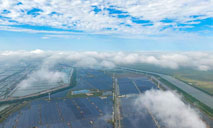COVID-19 vaccine supply needs to be expanded for global herd immunity: media

People line up to enter a vaccination clinic at the International Centre in Mississauga, Ontario, Canada, on May 13, 2021.(Photo by Zou Zheng/Xinhua)
"But the world is nowhere close to having enough," and "so far, only a small fraction of that has been produced."
WASHINGTON, May 16 (Xinhua) -- The production and supply of COVID-19 vaccines should be expanded by large margins in order to realize global herd immunity, which is obviously a herculean task that can only be accomplished with concerted efforts, reported The New York Times on Sunday.
About 11 billion shots are needed to vaccinate 70 percent of the world's population, a rough threshold needed for herd immunity, the Times quoted the estimate of the researchers at Duke University as saying.
"Vaccine manufacturers assert that a fix is already at hand as they aggressively expand production lines and contract with counterparts around the world to yield billions of additional doses," said the Times.

People get inoculated with COVID-19 vaccines at a drive-through vaccination site at the City College of San Francisco, the United States, April 29, 2021. (Xinhua/Wu Xiaoling)
Each month, 400 million to 500 million doses of the vaccines from Moderna, Pfizer and Johnson &Johnson are now being produced in the United States, according to the report, citing an American official with knowledge of global supply.
"But the world is nowhere close to having enough," and "so far, only a small fraction of that has been produced," it said.
While global production is difficult to measure, the analytics firm Airfinity estimates the total so far at 1.7 billion doses, it added.
The problem is that many raw materials and key equipment remain in short supply. And the global need for vaccines might prove far greater than currently estimated, given that the coronavirus presents a moving target: if dangerous new variants emerge, requiring booster shots and reformulated vaccines, demand could still dramatically increase, intensifying the imperative for every country to lock up supply for its own people.

A health worker administers a dose of COVID-19 vaccine to an electric rickshaw driver in Agartala, the capital city of India's northeastern state of Tripura, May 14, 2021. (Str/Xinhua)
Another problem standing out in the allocation of vaccine is that "wealthy countries have captured an overwhelming share of the benefit. Only 0.3 percent of the vaccine doses administered globally have been given in the 29 poorest countries, home to about 9 percent of the world's population, said the Times in its report.
"The only way around the zero-sum competition for doses is to greatly expand the global supply of vaccines. On that point, nearly everyone agrees," it added.
Photos
Related Stories
- Citizens receive COVID-19 vaccines in Hefei, E China
- Over 366 mln COVID-19 vaccine doses administered across China
- People receive COVID-19 vaccines at Anhui Agricultural University in Hefei
- Temporary vaccination site launched for deliverymen in Tianjin
- Over 332 mln COVID-19 vaccine doses administered across China
Copyright © 2021 People's Daily Online. All Rights Reserved.










